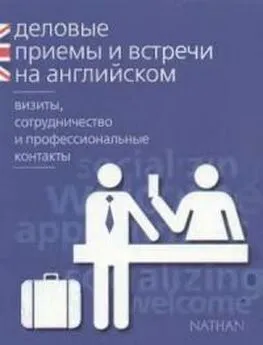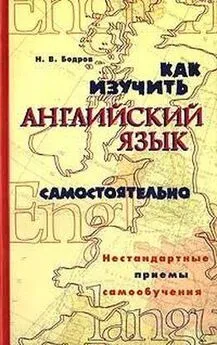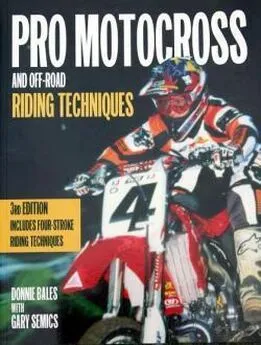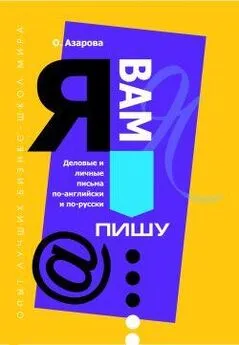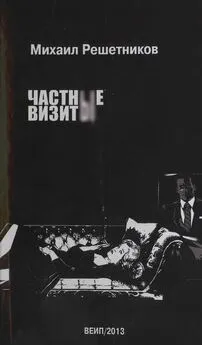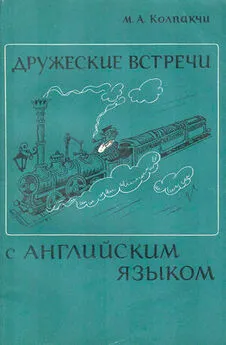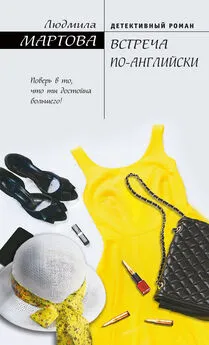Сирена Мердек-Стерн - Деловые приемы и встречи на английском: визиты, сотрудничество и профессиональные контакты
- Название:Деловые приемы и встречи на английском: визиты, сотрудничество и профессиональные контакты
- Автор:
- Жанр:
- Издательство:Астрель; АСТ
- Год:2005
- ISBN:нет данных
- Рейтинг:
- Избранное:Добавить в избранное
-
Отзывы:
-
Ваша оценка:
Сирена Мердек-Стерн - Деловые приемы и встречи на английском: визиты, сотрудничество и профессиональные контакты краткое содержание
Деловые приемы и встречи на английском: визиты, сотрудничество и профессиональные контакты - читать онлайн бесплатно полную версию (весь текст целиком)
Интервал:
Закладка:

Across:
1. _to our company.
2. I’m_I’m not.
g) _me. Are you John Jones?
h) What’s your_? — Erica Kotz.
Упражнение
A tittle confusion!
a) ? — do — how — do - you
b) to - factory - welcome - the
c) Jim - is - this
d) Jeremy - please - me - call
e) too — pleased — to - I’m — you — meet
f) ? — a — you — journey — have - did — good
g) ? — you — a — like — would — coffee
h) ? — lawyer — I — my — may — to — you — introduce (two possible answers)
i) ? — Simon — me — Hardy — you — excuse — are
j) colleague — the — Susan — is — office — a — Peter — London — this — from
Упражнение
Help! What 1. should I say?
2.
3.
4.
5.
6.
7.
8.
How do you do?
a) \fery well.
b) I’m fine thank you.
c) How do you do?
Excuse me, are you Bill Smug?
a) No.
b) Yes, I am.
c) I’m afraid I’m not.
Please call me Mark.
a) OK.
b) Certainly, do call me Sheila.
c) My name’s Mr Jones.
May I introduce you to Mrs Melly?
a) Hello.
b) How do you do?
c) I’m pleased to meet you.
Welcome to First Fruit Inc.
a) Thank you.
b) Thanks.
c) Great!
What’s your name?
a) Bill Smith.
b) Jock.
c) Mrs Jane Hyde.
I’m sorry.
a) It doesn’t matter.
b) Never mind.
c) Not at all.
Did you have a good trip?
a) Yes, thank you.
b) No.
c) Fine, thank you.

Упражнение
a) Anglophones shake hands only the first time they meet someone.
b) In all other countries in Europe people shake hands whenever they come and go.
c) In the USA or UK a weak handshake implies a lack of character, whereas in Thailand you should shake hands gently.
d) Pfeople in England almost never kiss each other, but in Belgium and France they always kiss twice.
e) If you are travelling to the Far East, you should either bow or put your hands together in a prayer gesture as a means of greeting — check the details of each country before you go.
f) “Sorry” and “Excuse me” mean the same thing.
g) Ms is an unmarried woman.
h) In English, the longer the sentence, the more polite it usually is.
i) When you meet someone you should use their nickname.
j) It is polite in English to answer “Yes” or “No” alone.
k) Anglophones are likely to use your first name immediately.
l) On the other hand, Anglophones can be very old fashioned about manners and formalities.
m) “Morning” or “Afternoon” are commonly used as an informal way of saying “Good morning” or “Good afternoon”.
n) When exchanging business cards with someone from the Far East, take care to look carefully at the card before putting it in your pocket. Do not write anything on it!
o) When you meet an English-speaking person, you can say: “How do you do Sir/Madam?”
p) “You’ve met before, have you?” means the same as “You haven’t met before, have you?”
Ч) If you say “sorry” as you bump into someone, they should answer “sorry”.
r) f n Northern Hemisphere countries status goes with seniority and age whereas lnl^tin and Asian cultures status has to be achieved — be careful not to cause offence.
s) ‘Tve been dying to meet you” means that the person has heard a lot about Уор and has been looking forward to it.
*) I don’t think we’ve been introduced?” is a good way of introducing yourself. u) To “stand on ceremony” means that you are talking about a wedding.

Dialogue
Following the trade fair; Fred Max goes to a meeting at Purple Pears Inc.
S. Ball: Fred, how are vou? It’s nice to see you again.
F. Max: Fine* thanks. Simon, and vou?
S. Ball: Could be worse. I suppose.
F. Max: That doesn’t sound too good. What’s the problem?
S. Ball: We’ve had one or two hiccups at the Manchester production plant. I won’t bother
you with that now. I’m so glad you could come and see us here. I suggest that we begin with the meeting at 10 o’clock, after which I’ll show you around the factory. If you have time, I’d like to take you out to lunch afterwards. Come and meet our new consultant, Sarah Lee. Sarah, this is Fred Max, from Blue Bananas.
F. Max: I think we’ve met before. Didn’t you use to work for Cerise, in Nice?
S. Lee: Yes, I did, and I still do. How nice to see vou again! How are vou?
F. Max: Very well, thank vou. and vou? How’s business?
S. Lee: Going well, thank you. We’ve taken on several new members of staff since we
last met, and we have moved our offices to the centre of town.
S. Ball: I’m glad you could come to the meeting, Fred. We have a lot of things to dis
cuss. I’m afraid the sales director is a little late so we’ll have to start without him, but I’m sure we can manage!
F. Max: Right, let’s get down to business.
Seeing an old friend again
While visiting the factory, Fred meets an old acquaintance.
F. Max: Hello, do vou remember me? Fred Max.
B. Murdoch: Fred! What a turn up for the books! How nice to see you again! How are things?
F. Max: Not too bad. Funnily enough, James Bond was asking after you recently.
B. Murdoch: Have you got time for a coffee? Let’s go to the canteen for five minutes.
B. Murdoch: So, how’s business?
F. Max: Ticking along nicely. My wife won’t believe that I’ve run into you. Do call in
on us next time you’re near home.
B. Murdoch: I don’t get that wav very often, but it would be lovely. I’m sure I have your address in my little black book - I’ll give vou a ring. Well, I must be off. I have to go and pick up a new trainee from the station. Send my regards to Jane, won’t you?
F. Max: It was nice seeing you again...
Встреча со знакомым 2

Активный СЛОВАРЬ
Когда вы встречаете человека, которого уже знаете, вы можете вести себя официально или нет, в зависимости от ваших отношений с этим человеком.
Seeing someone again - formal Good morning, MrX, how are you?
\fery well, thank you, Mr Y. And you? Vfery well, thank you.
Г"'---- " - V.:: V
Hello, Simon, how are you?
Fine, thanks, John, and you?
Fine, thanks. It’s nice to see you again.
How’s business? How are things? Going well, thank you.
I’m afraid...
Let’s get down to business.
How nice to see you again!
How lovely to see you!
She was asking after you.
I can’t believe I ran into you.
Leaving someone 1 1 Ho call in on us. 1 U give you a ring / buzz.
2 2 must be off. Send / give my regards to Jane, it was nice seeing you.
Здравствуйте, г-н X, как поживаете?
Очень хорошо, спасибо. А вы? Очень хорошо, спасибо.
Здравствуйте, Саймон, как поживаете?
Очень хорошо, спасибо, Джон. А вы?
Хорошо, спасибо. Я рад(а) вас видеть.
Как идут дела? Как жизнь?
Все хорошо, спасибо.
Мне жаль... Я боюсь...
Примемся за работу.
Как приятно тебя снова видеть! Как приятно тебя видеть!
Она спрашивала о тебе.
Неужели это ты?
Заходите к нам как-нибудь.
Я вам позвоню.
Мне пора идти.
Передайте привет Джейн.
Был рад тебя повидать.
 |
| с |
| I |
|---|
 |

Упражнение
The snake
howareyoudoyouremembermewhatisthematterverywellthankyoushesen
dsherregardsimustbeoffhowarethingsitisnicetoseeyouagainhowisbusin
essfinethanksandyouiwillgiveyouaringiamsorrytohearthat
Out of order
Dialogue 1:
a) Pleased to meet you too. Do call me Martin.
b) That’s very kind of you. Do you know my colleague, Sarah Pascall?
c) Very well thank you, Mr Hyde, and you?
d) No, I don’t. How do you do?
e) Good morning, Mrs Bird, how are you?
f) And you must call me Sarah. Shall we get down to business?
g) I’m fine, thank you. Would you like some coffee?
h) How do you do? I’m pleased to meet you.
i) Yes, here is our latest catalogue...
Dialogue 2:
a) Enterprise Requirement Planning.
b) Not too good, I’m afraid.
c) I’m sorry about that. Can I do anything to help?
d) Hi Jerry, how are you?
e) Oh dear! What’s the matter?
Читать дальшеИнтервал:
Закладка:
